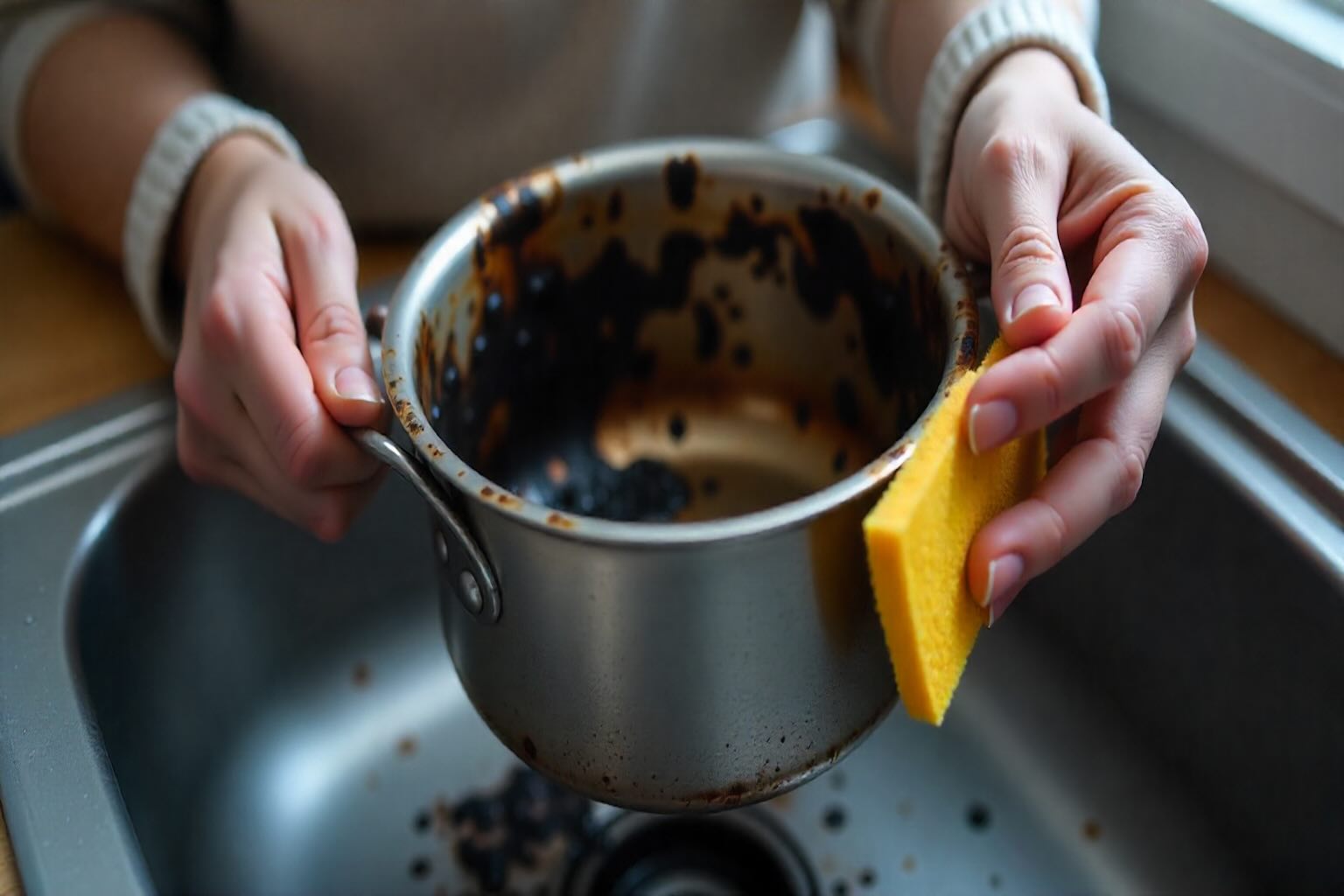Few things are as disheartening in the kitchen as discovering a pot scorched at the bottom after a meal goes wrong. The blackened residue clings stubbornly, and hours of scrubbing with sponges or steel wool often feel like an endless battle. Many people reach for chemical-heavy cleaning sprays or expensive scrubbing solutions, but there’s actually a safer, cheaper, and surprisingly effective option sitting right in your pantry. Baking soda, a common household staple, has long been trusted as a natural cleaner capable of restoring even the most burnt cookware.
The science behind baking soda’s cleaning power
Baking soda, or sodium bicarbonate, isn’t just useful in baking cakes or neutralizing fridge odors. Its cleaning ability comes from a unique combination of chemical and physical properties. The powder is alkaline, which helps break down greasy and acidic food residues, and its tiny granules provide a mild abrasive effect that gently lifts stuck-on food without damaging cookware surfaces.
What sets baking soda apart from commercial cleaners is its balance: strong enough to tackle burnt food, but gentle enough for everyday use. Stainless steel, ceramic, and even cast-iron pots can all be treated without fear of scratches or permanent damage.
When hot water is added, baking soda becomes even more effective. Heat enhances the reaction, softening and loosening burnt particles bonded to the pot’s surface. This is why soaking a scorched pot in hot water with baking soda can do the heavy lifting, reducing the need for aggressive scrubbing.
Another major advantage lies in its environmental impact. Unlike chemical cleaners that release toxins into water systems, baking soda naturally biodegrades. Scientists and eco-conscious households alike recommend it as a safe, green cleaning alternative. Choosing baking soda means keeping your kitchen sparkling clean while reducing your ecological footprint.
Simple step-by-step method for rescuing burnt pots
One of the best things about cleaning with baking soda is that it doesn’t require complicated instructions or special tools. Here’s a straightforward method anyone can follow:
-
Fill the pot with hot water – Make sure the burnt area is completely covered. For best results, use very hot or even boiling water.
-
Add baking soda – Sprinkle in one or two tablespoons. For bigger pots or tougher burns, add a little more. The solution may start to fizz slightly, signaling that the cleaning reaction has begun.
-
Let it soak – Allow the mixture to rest for 15–20 minutes. This soaking period gives the baking soda time to soften the charred food. For extra stubborn residue, extend the soaking time or bring the solution to a gentle simmer for a few minutes.
-
Scrub gently – Use a kitchen sponge or non-abrasive pad to wipe away the loosened debris. You’ll notice that the burnt material comes off far more easily.
-
Repeat if needed – For extremely tough spots, repeat the process until the surface is restored.
This method doesn’t just clean effectively—it also saves you time and effort. Instead of scraping endlessly, you let the baking soda do most of the work.
Beyond pots: versatile applications of baking soda
The usefulness of baking soda stretches far beyond burnt cookware. In fact, many people consider it an all-purpose cleaning powder for the entire home.
-
In the kitchen: It deodorizes refrigerators, freshens cutting boards, and helps clean coffee makers or microwaves. A quick paste made from baking soda and water can even tackle oven stains.
-
In the bathroom: Its mild abrasiveness works wonders on soap scum, water stains, and mineral buildup. When mixed with vinegar, it becomes a safe yet powerful alternative to bleach for cleaning grout or removing mold.
-
For freshening fabrics: Sprinkling baking soda on carpets before vacuuming can neutralize odors. It’s also a trusted solution for removing smells from shoes or laundry hampers.
What makes these uses particularly appealing is cost. A single box of baking soda costs only a fraction of what specialized cleaning products do, yet it performs multiple roles with equal or greater effectiveness. This versatility explains why it has been a household essential for generations.
Why natural cleaning matters for kitchen safety
Using baking soda to clean burnt pots isn’t just about convenience—it’s also about protecting your health. Many commercial cleaners contain chemicals that may leave residues on cookware surfaces. Even trace amounts can transfer to food during cooking, raising concerns about long-term exposure.
Natural cleaners like baking soda eliminate this risk. It leaves no harmful residue and produces no toxic fumes. This is especially important in small or poorly ventilated kitchens where strong chemical smells can linger.
Families with young children or pets benefit the most. Traditional cleaners can pose risks if touched, inhaled, or accidentally ingested. By contrast, baking soda is food-grade and safe to handle, providing peace of mind while still delivering excellent cleaning results.
The trend toward natural cleaning reflects a larger shift toward sustainable and health-conscious living. Choosing baking soda is part of that movement—a simple step that protects your cookware, your family, and the environment.
a simple pantry solution with big results
The next time you’re staring down a pot blackened from an overcooked meal, don’t panic or reach for harsh chemicals. The solution is likely sitting in your cupboard already. Baking soda, with its unique mix of abrasiveness, alkalinity, and eco-friendliness, can transform burnt cookware with minimal effort.
Beyond rescuing pots, it doubles as a versatile cleaner for your whole home, from bathrooms to carpets. Affordable, effective, and safe, this kitchen staple proves that sometimes the simplest tools are the most powerful.
By embracing natural cleaning with baking soda, you’re not only making your life easier—you’re also contributing to a healthier, more sustainable way of living. And that’s a win for both your household and the environment.
